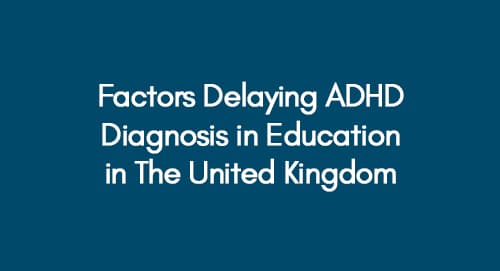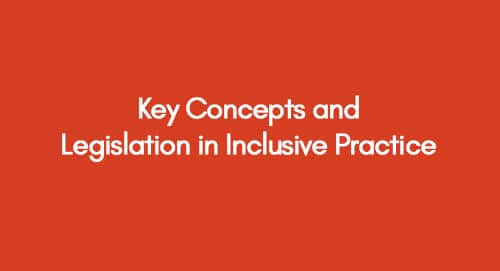
Website Attributes on Consumer Buying Pattern: Case Study of Amazon and eBay
September 6, 2022
Factors Delaying ADHD Diagnosis in Education in The United Kingdom
September 6, 2022The essay is based on highlighting the role of equity and inclusive practice in fulfilling the special learning needs of disabled students. The current essay specifically emphasizes the provided case study of Tom who is a victim of Down syndrome and about to study in mainstream school. Thus, the current essay features social, political, and economic factors that may influence practitioners’ ability to successfully ensure the inclusion of Tom in mainstream classrooms. The essay considers attitude and perception of disability, models of disability, and the influence of media in labeling disabled students along with the socioeconomic status of the child and their family as social factors that may influence practitioners’ ability to successfully ensure inclusion. Moreover, the essay reviews legislation for inclusive practice and the government's stance on inclusion to contemplate the political factors that may affect practitioners’ ability to successfully ensure inclusion. While, the essay highlights historic and current issues with funding, training for SEND, and personal budget for children with an EHCP plan as appropriate economic factors that may influence practitioners’ ability to successfully ensure inclusion.
Social, political, and economic factors that may influence practitioners’ ability to successfully ensure inclusion
Social Factors
Attitudes and perceptions of disability
According to the research of Lombardi (2010), attitudes and perceptions on disability vary with person and community. A similar researcher added that in some societies, individuals with a disability are viewed as burdens (Lombardi, 2010). While the research of Esmail et al. (2010) indicated that a positive attitude toward disability inclines several institutions to serve the special needs of disabled individuals in their community. In terms of students with disability, the study of Murray et al. (2009) highlighted that attitudes and perceptions of other students on disabled students influence the ability of tutors for ensuring inclusion in the classroom. Moreover, the research of Lombardi (2010) emphasizes on the perception of community and society on disabled students assists a practitioner in making an inclusive learning environment. In terms of Tom’s scenario, if society morally disregards the inclusion of Tom at mainstream school, it would affect his self-esteem and reduces his potential and confidence for learning.
Models of Disability
According to the research of Fisher and Goodley (2007), models of disability are categorized into three forms the social model, the medical model, and the charity model. The medical model of disability is based on the phenomenon that disability is an attribute of an individual (Sullivan, 2011). Moreover, the research of Fisher and Goodley (2007) stated that the medical model of disability simply considers disability to be a consequence of health conditions. According to Oliver (2013), the social model of disability considers external environmental factors that limit the ability of an individual rather than any impairment or condition. A similar researcher added that society creates social barriers for an individual to access basic facilities (Oliver, 2013). However, the study by Martin (2013) focused on the individual-environment model of disability or functional disability which is a combination of both medical and social models. A similar author added that the functional model states the medical condition of an individual inclines society to limit the function of that individual (Martin, 2013).
Influence of Media in labeling Disabled Students
The research of Thomson (2012) contemplated that media plays a prominent role in labeling disabled students which affects their self-esteem and minimizes their inclination to get qualitative education, which consequently restricts the practitioner in inclusive teaching. Moreover, the research of Riddell and Weedon (2014) highlighted media undermines the ability of disabled students through labeling due to which their motivation level declines and they misbehave during inclusive sessions that resulting in the dismissal of inclusion. While the study of Asuncion et al. (2012) highlighted that media assists a practitioner in getting funding from various social institutions to promote the practice of inclusion. If the media emphasizes the negative element of disabled students like Tom, his effort to achieve and perform up to the level would be undermined by society and thus affect his capability of communicating effectively and working collaboratively with peer students.
Socioeconomic Status of the child and their family
In the research of Wei, Lenz, and Blackorby (2013), the author described that the good socioeconomic status of a family facilitates a practitioner in arranging the facilities and resources that satisfy the special need of a disabled student. Moreover, the study of Szumski and Karwowski (2012) asserted that the weak socioeconomic status of a family would hinder the practitioner in fulfilling all the special needs of disabled students. In the current case, their mother of Tom thinks that he could get a good learning experience in a mainstream setting as his brother goes to a similar school and would take care of his special learning needs of Tom.
Political Factors
Legislation for Inclusive Practice
In the studies of Johnson, Minogue, and Hopklins (2014), the primary legislation for inclusive practice disregards discrimination in education and promotes inclusive education. Moreover, a similar author added that the Equality Act 2010 in the UK prohibits educational institutions from tolerating any kind of discriminating act against a disabled student (Johnson, Minogue, and Hopklins, 2014). Furthermore, the report of Csie.org.uk. (2018) highlighted that International Human Rights law highly promotes an inclusive learning environment and protect the rights of children with racial difference, disability, and sexually different students. However, the study of Du Plessis (2013) focused on the Children and Families Act 2014 which emphasizes on removing the barriers to inclusive learning in mainstream education such as discrimination and other limitations. The Children and Families Act 2014 protects the rights of disabled students in a mainstream setting and uses the Equality Act 2010 to eradicate the practice of discrimination against disabled students in inclusion (Csie.org.uk. 2018). Such steps of government remove the barriers for disabled students like Tom and provide him extensive opportunities for inclusive learning and getting qualitative education in a mainstream setting.
Government's stance on inclusion
In terms of the government of the UK, there are several steps taken by the government to eradicate the issue of discrimination faced by disabled students in mainstream education (Smith, 2010). A similar researcher added that the government made regulatory bodies to monitor and solve the issue of discrimination in inclusive learning (Smith, 2010), According to the study of Du Plessis (2013), the government of the UK ran multiple campaigns on inclusion that facilitated the practitioner is creating a diverse learning environment that include the disabled students in mainstream classrooms. Moreover, legislation like Equality Act 2010 and Children and Families Act 2014 made by the government helped multiple educational institutions in establishing strong policies on inclusive learning and highlighted the special needs of disabled students that assisted the practitioner in providing qualitative sessions which ensured equal satisfaction of needs of disabled students along with other normal students in inclusive setting (Johnson, Minogue, and Hopklins, 2014). The Salamanca Statement (Unesdoc.unesco.org. 1994) emphasized on the provision of children's rights that can be helpful for students like Tom to attain a maximum potential of learning in mainstream settings.
Economic Factors
Historic and Current issues with Funding
The research of Hockings, Brett, and Terentjevs (2012) stated that historically, students with disabilities were deprived of getting limited funding, however, the emergence of progressive funding models, like disability scholarship minimized the issue of funding faced by students with disability. However, the research of Brandon and Charlton (2011) contemplated that the privatization of educational institutions in recent years led to a cut-off on public funding and disability scholarships due to which, the education of disabled students suffered. While, the study of Sharma, Forlin, and Furlonger (2015) emphasized on the lack of awareness about inclusive learning and special education needs of disabled students in the past was the reason for low funding. Moreover, the study of Hockings, Brett, and Terentjevs (2012) asserted that technological innovation enabled the practitioners in understanding the special needs of disabled students and convince the external parties to invest in the promotion of inclusion. The lack of funding would create a challenge for Tom in getting the required facilities for learning even though Tom has Down syndrome which affected his ability for getting a proper education.
Training for SEND
According to the research of Shani and Hebel (2016), SEND courses were introduced for teachers to support the autistic needs of students who have multiple disabilities in learning. A similar author regarded that SEND courses provide specialized training to practitioners that gave them in-depth knowledge on unique issues faced by students with different learning disability; Moreover, it consequently enables the practitioners in developing inclusive lesson plan which satisfies most of the special learning needs of disabled students along with non-autism students (Shani and Hebel, 2016). SEND training comprises various methods for empowering and inspiring students with disabilities along with a range of evaluative techniques to measure the performance of special students (Nasen.org.uk. 2020). The SEND training would enable the teachers to understand their special needs of Tom which would assist him as his maximum needs of learning would be fulfilled by SEND certified teachers.
Personal budget for children with an EHCP plan
By relating to the current case of Tom, if the practitioner and guardian Tom establish a personal budget for Education, Health, and Care Plan for Tom, it would ease the practitioner in fulfilling their special needs of Tom by arranging all the necessary resources that do not affect his condition of Down syndrome while improving his capability of learning.
Conclusion
To conclude, it has been found that attitudes and perception of society, as well as media on disabled students, influences the ability of the practitioner to successfully ensure inclusion positively and negatively. While, the social, medical, and functional models of disability highlighted multiple categories of disability perceived by society. Additionally, the essay presented the legislation and the role of the government in inclusive learning of disabled students and found that the government of the UK is actively promoting inclusive learning through running awareness campaigns and generating funds. Moreover, the economic factors such as issues of funding in the past and present, provision of SEND training to teachers, and personal budget for disabled students would improve the quality of care and fulfill the learning needs of Tom in a mainstream setting.
References
Asuncion, J.V., Budd, J., Fichten, C.S., Nguyen, M.N., Barile, M. and Amsel, R., 2012. Social media use by students with disabilities. Academic Exchange Quarterly, 16(1), pp.30-35.
Brandon, T. and Charlton, J., 2011. The lessons learned from developing an inclusive learning and teaching community of practice. International Journal of Inclusive Education, 15(1), pp.165-178.
Csie.org.uk. 2018. Legislation And Guidance For Inclusive Education. [online] Available at: <http://www.csie.org.uk/inclusion/legislation.shtml> [Accessed 8 May 2020].
Du Plessis, P., 2013. Legislation and policies: Progress towards the right to inclusive education. De Jure Law Journal, 46(1), pp.76-92.
Esmail, S., Darry, K., Walter, A. and Knupp, H., 2010. Attitudes and perceptions towards disability and sexuality. Disability and rehabilitation, 32(14), pp.1148-1155.
Fcrr.org. 2016. Florida Center For Reading Research. [online] Available at: <https://fcrr.org/news/news_comp_center.html> [Accessed 8 May 2020].
Fisher, P. and Goodley, D., 2007. The linear medical model of disability: Mothers of disabled babies resist with counter‐narratives. Sociology of health & illness, 29(1), pp.66-81.
Hockings, C., Brett, P. and Terentjevs, M., 2012. Making a difference—inclusive learning and teaching in higher education through open educational resources. Distance Education, 33(2), pp.237-252.
Johnson, K., Minogue, G. and Hopklins, R., 2014. Inclusive research: making a difference to policy and legislation. Journal of Applied Research in Intellectual Disabilities, 27(1), pp.76-84.
Lombardi, A., 2010. Measuring faculty attitudes and perceptions toward disability at a four-year university: A validity study (Doctoral dissertation, University of Oregon).
Martin, J.J., 2013. Benefits and barriers to physical activity for individuals with disabilities: a social-relational model of disability perspective. Disability and rehabilitation, 35(24), pp.2030-2037.
Murray, C., Lombardi, A., Wren, C.T. and Keys, C., 2009. Associations between prior disability-focused training and disability-related attitudes and perceptions among university faculty. Learning Disability Quarterly, 32(2), pp.87-100.
Nasen.org.uk. 2020. Online Learning: Focus On SEND. [online] Available at: <https://nasen.org.uk/training-and-cpd/online-learning.html> [Accessed 8 May 2020].
Oliver, M., 2013. The social model of disability: Thirty years on. Disability & society, 28(7), pp.1024-1026.
Riddell, S. and Weedon, E., 2014. Disabled students in higher education: Discourses of disability and the negotiation of identity. International Journal of Educational Research, 63, pp.38-46.
Shani, M. and Hebel, O., 2016. Educating towards Inclusive Education: Assessing a Teacher-Training Program for Working with Pupils with Special Educational Needs and Disabilities (SEND) Enrolled in General Education Schools. International Journal of Special Education, 31(3), p.n3.
Sharma, U., Forlin, C. and Furlonger, B., 2015. Contemporary models of funding inclusive education for students with Autism Spectrum Disorder.a
Smith, M., 2010. Lecturers' Attitudes to Inclusive Teaching Practice at a UK University: Will staff “resistance” hinder implementation?. Tertiary Education and Management, 16(3), pp.211-227.
Sullivan, K., 2011. The prevalence of the medical model of disability in society.
Szumski, G. and Karwowski, M., 2012. School achievement of children with intellectual disability: The role of socioeconomic status, placement, and parents’ engagement. Research in developmental disabilities, 33(5), pp.1615-1625.
Thomson, M.M., 2012. Labelling and self‐esteem: does labelling exceptional students impact their self‐esteem?. Support for Learning, 27(4), pp.158-165.
Unesdoc.unesco.org. 1994. The Salamanca Statement and Framework for Action on Special Needs Education. [online] Available at: <https://unesdoc.unesco.org/ark:/48223/pf0000098427> [Accessed 18 May 2020].
Wei, X., Lenz, K.B. and Blackorby, J., 2013. Math growth trajectories of students with disabilities: Disability category, gender, racial, and socioeconomic status differences from ages 7 to 17. Remedial and Special Education, 34(3), pp.154-165.aa
Free Dissertation Topic






















